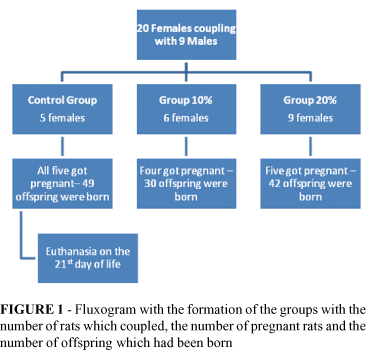PURPOSE: Determine the effects of the MSG (monosodium glutamate) in the offspring of pregnant rats through the comparison of the weight, NAL (nasal-anal length) and IL (Index of Lee) at birth and with 21 days of life. METHODS: Pregnant Wistar rats and their offspring were divided into 3 groups: GC, G10 and G20. Each of the groups received 0%, 10% and 20% of MSG, respectively from coupling until the end of the weaning period. RESULTS: Neither weight nor NAL were different among the groups at birth. The group G20 at birth had an IL lower than the group GC (p<0,05) and with 21 days of life presented weight and NAL lower than the groups G10 and this lower than the GC (p<0,01). Otherwise the G20 at 21 days of life had the IL similar to the other two groups. The weight profit percentage from birth to the 21st day of life was lower in the G20 regarding the other two groups (p<0,01). The G20 had a NAL increase percentage from birth to the 21st day of life lower than the G10 and this lower than the GC (p<0,01). CONCLUSIONS: MSG presented a dose-dependent relation in the variables weight and NAL. It caused a decrease in the growth pattern as well as in the weight gain pattern until the 21st day of life. The IL of the group 20% had an increased in relation to the control group after 3 weeks of follow up.
Obesity; Sodium Glutamate; Pregnancy; Rats






